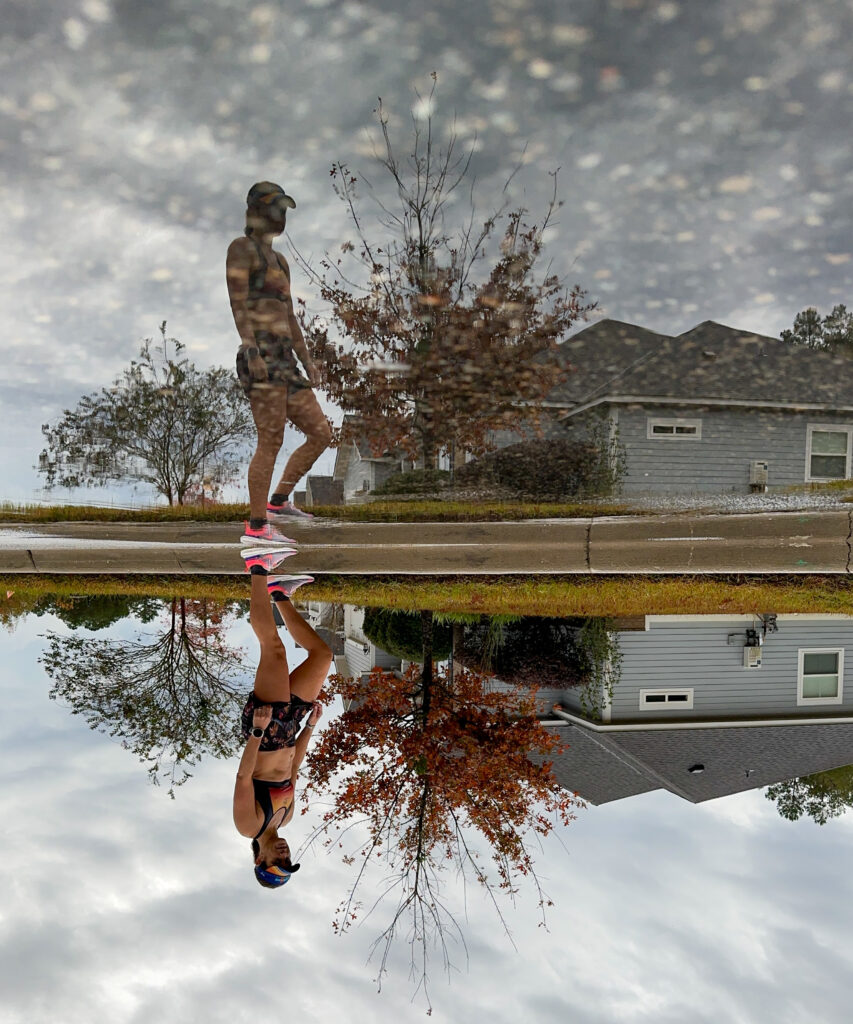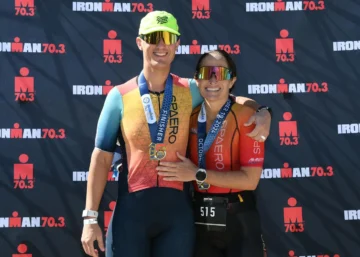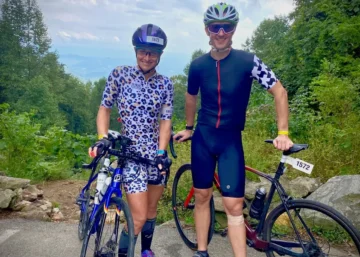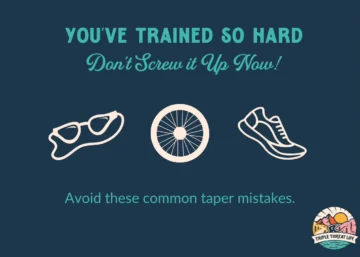
“I’m not a real athlete.”
“I’m not fast like them.”
“I’m not naturally talented. I’ve just learned to work harder than others.”
“It was just a good day. I got lucky.”
On the surface, some of these statements might seem humble- downplaying success- but that’s not it at all. These types of thoughts are hallmarks of imposter syndrome.
First described in 1978, imposter syndrome is a psychological condition that involves the persistent inability to recognize your own success. It’s a cognitive distortion that results in people doubting their own abilities. You might feel anxious about being discovered as a phony or fraud, despite objective, external evidence to the contrary.
Imposter syndrome is common among high-achievers in all fields, but especially in athletes. Combine the high pressure nature of competition with external scrutiny from society, teammates, coaches, ect. and you have the perfect conditions for imposter syndrome to take hold.
Let’s set this up.
You hold yourself to a high standard and strive for perfection. If you fall short, you experience self-doubt and feel inadequate. Because you’re surrounded by other high achievers, it’s easy to develop feelings of inferiority.
The consequences are increased anxiety, negative self-talk, burnout, or even depression. You start underperforming due to fear of failure, or you sabotage your own development because you don’t believe you can achieve, or don’t deserve to achieve success.
See if any of these ring true for you.
- Do you doubt yourself and your abilities?
- Do you fear not being able to live up to expectations?
- Do you focus on mistakes instead of progress?
- Do you have a hard time accepting a compliment?
- Do you attribute your success to external factors?
- Do you constantly compare yourself to others?
- Do you let a bad performance define your sense of self?
“You can leave the GPS watch at home if it doesn’t lift your soul up, and you should probably not be taking mile splits unless you can feel good about yourself no matter what those splits say.”- David Roche, Triathlete
PRs, Podiums, and Performance
How do you define success? By that I mean, what does it take for you to consider yourself to be a success?
Does it mean achieving a PR? What about a podium finish? Is success defined by receiving a World Championship slot?
These things are great, but if that’s the only way you define success, then you’re likely setting yourself up for failure. That’s because athletic accomplishments are few and far between.
Even the most high performing athletes will spend 90% of their time training, learning, and practicing skills, while only 10% of the time competing. Therefore, the likelihood of consistent, repeated success over a long period of time is very rare.
Sometimes you’re on top and sometimes you’re injured, in a performance slump, or having a bit of bad luck. If the only way you measure success is with external validation… well that’s a hard, lonely road to travel.
If you need an example, consider the defending 800-meter gold medalist, Athing Mu, who will miss Paris this year after falling in the finals at the Olympic trials. Sport can be brutally heartbreaking.
But the difference is that when you fail, there’s another race the next week, month, or year. Athing Mu will have to wait four more years before she can try again. In the meantime, how will she define what success looks like?
Elite athletes feel it too
If an Olympic gold medalist struggles with self-worth and feelings of inadequacy then what hope is there for the rest of us? All joking aside, I’ve interviewed enough elite athletes in my time to know that, despite what people may think, they’re just like us. Certainly, they’ve been gifted with incredible physical attributes, but they also suffer from:
- Fear of failure
- Unrealistically high expectations
- Perfectionism
- Feelings of inadequacy
- Comparison to other athletes
In an interview I did with Emma Pallant Browne a few months back, she explained how age-group triathletes are actually the ones who inspire her.
“I think I get imposter syndrome when someone tells me I inspire them,” she says. “To me, that’s really touching, especially when I talk to them and hear what they achieve in triathlon as well as balancing a family, work, and multiple things in life. It’s them who actually inspires me!”
Last year, I had the opportunity to chat with David Tilbury-Davis, a coach who’s worked with a number of top athletes over the years like Ashleigh Gentle, Lionel Sanders, Matt Hanson, Cody Beals and who currently trains Skye Moench and Laura Zimmerman.
We talked about how imposter syndrome isn’t pseudo-psychology. It’s a very real thing that can be crippling to even the best in the sport. If anything, elite athletes are probably more likely to suffer from imposter syndrome than your regular, average Joe.
“When you look at the very best in the world, they do suffer from imposter syndrome and reasonably high levels of anxiety,” he says. “They can’t be the best in the world if they aren’t incredibly focused on getting marginally better, which means they have some self-doubt.”
“Where the best in the world are different is they have a high level of introspection and understanding of their internal feelings. They can think about self doubt and anxiety and process it in a way where they think about working on this or that detail; whereas other people who haven’t developed that introspection get crippled by it.”
“If you have gaps in your confidence, your expectations can trigger pressure and doubt, which will make you fear whether you’re ready to compete or if you even deserve to be there. That fear ultimately isn’t about if you’re prepared or ready. It’s about the fear of failing to reach those expectations.”- Dr. Jen Faber, Triathlete
How to give imposter syndrome the finger
From now, until the end of time, there will never be another person with your unique set of skills, your personality, your thoughts and attitudes, your strengths, and yes, your weaknesses. You are a unique and wonderful creation, so why don’t you think you’re worthy? Because you’re different? Because you’re not good enough?
Who says? And more importantly who cares!
Stop. That. Right. Now.
You are amazing, if for no other reason than you are completely and uniquely one of a kind.
But it’s easier said than done, so here are 6 strategies to give imposter syndrome the finger.
1. Challenge negative self-talk– Be your own hype man! Tell yourself (out loud if you can) what your strengths are as an athlete. There’s a common misconception that positive self-talk just means saying nice things to yourself, like “I’m amazing!” But that’s not really helpful, is it?
Saying nice things is part of it, but self-talk can also be instructional. Talk through whyyou’re doing what you’re doing, what you want to achieve, and how you’re going to do it. For some inspiration, watch this great compilation of NFL players using self-talk.
- Stop ruminating– Get out of your own head. This is a challenge for me. When something is bothering me, I get in a pattern of circling thoughts where I replay conversations or events over and over again. What helps me is getting those thoughts out of my head. I talk to my husband, or my dog, but you can also write them out on a piece of paper.
- Recognize achievements– Chances are, you’ve had some level of success in the past, whether it was in a race or even just a workout. You’ve learned, grown, and achieved something in your life. Think about those times and the hard work that you put in. Recognize your achievements and have pride in what you’ve accomplished.
- Focus on the process rather than the outcome– We can’t always control the outcome of a race, or a workout, or even life. If you’re the type of person who places a lot of importance on external factors like time, pace, or placings, try relieving some of the pressure by focusing on the steps you will need to take to achieve your ultimate goal. You can’t control the outcome, but you can control the process that will help give you the best chance at achieving the outcome. There’s a difference.
- Acknowledge your talent– Why do we always focus on our weaknesses instead of our strengths? If you’re competing in a triathlon, or even simply swimming, cycling, running, cross-fitting, or whatever, you have, at a bare minimum, a modicum of talent. You are good at something, probably a few things. Think about what those things might be.
- Learn to embrace failure– Failure has such a negative connotation, but it can be a good thing! It’s a natural part of sports and it happens to every, single athlete so learn to accept it now. You will fail at some point. That’s a certainty. But those who can use failure as an opportunity to learn and grow will be better for it because they build resilience and confidence from overcoming adversity.
- Assess the evidence– This is a practical tip. If you have a hard time thinking about your strengths, try this exercise. Make two columns on a piece of paper. On one side write, “Evidence I am inadequate” and on the other, “Evidence I am amazing.” This can help to provide some perspective.
Honestly, I don’t have the answer for how to fix imposter syndrome, but you can sure as heck give it the finger.
David Roche wrote a great article about imposter syndrome for TrailRunnerMag and there’s a quote I loved.
“Remember that there’s no light at the end of the tunnel, just more tunnel. There’s no endpoint of validation that will come from running, that’s for sure. You’re going to screw up and fail, many times over. That’s part of the fun! We can celebrate that together alongside the successes… So embrace the darkness in the tunnel as much as you can, even if it’s daunting sometimes. Grab a light, find some friends, and ideally a therapist or other professional to talk to. We’re all in this tunnel together, and together, we form an amazing tunnel gang.”
If you want to be part of my tunnel gang, be sure to sign up for the Triple Threat Life newsletter to get new posts delivered to your inbox weekly.




